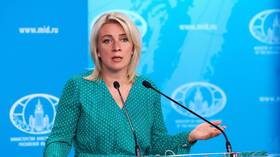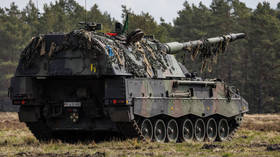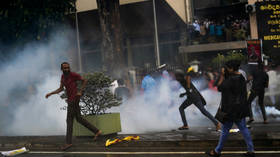Russia accuses Estonia's FM of inciting ‘violence’

The Russian Foreign Ministry condemned on Sunday what it called the “heinous logic” of Estonia's top diplomat, Urmas Reinsalu, accusing him of inciting violence in Russia.
The Baltic nation’s foreign minister earlier told the local Postimees newspaper that if some Russians had “taken cobblestones into their hands,” the situation in Russia would have been different.
“Has Mr. Reinsalu gone insane?” the Russian Foreign Ministry’s spokeswoman, Maria Zakharova, wrote in a Telegram post. “What is he calling for? Violence?”
Zakharova described the minister’s words as “the heinous logic of an Estonian ignoramus” and accused him of advocating “unacceptable methods.”
The Foreign Ministry spokeswoman also warned that by making such statements, Western officials are “destroying” one of the pillars of their own statehood, the “infeasibility of physical altercations and violence.”
Reinsalu's remarks came before the EU foreign ministers’ meeting in Prague, where they were expected to discuss travel restrictions for Russians. Estonia was one of the most vocal advocates of a total ban on Schengen visas for Russians, except for certain “humanitarian” reasons.
Speaking to Postimees in late August, Reinsalu said such a ban would have a “moral nature,” and “exert pressure on the Russian society.”
The Estonian foreign minister called the Russian military operation in Ukraine “not just Putin’s war but that of the Russian nation, which includes not just the government and the territory but the population as well.”
“There must always be someone, who would take a stone in his hand,” the minister argued, adding that “if just one percent of the Russian population had taken cobblestones in their hands, it would have caused some changes.” Sanctions should send a “signal” to the Russians that “their life cannot go on as normal,” Reinsalu added.
Russia sent troops into Ukraine on February 24, citing Kiev’s failure to implement the Minsk agreements, designed to give the regions of Donetsk and Lugansk special status within the Ukrainian state. The protocols, brokered by Germany and France, were first signed in 2014. Former Ukrainian president Pyotr Poroshenko has since admitted that Kiev’s main goal was to use the ceasefire to buy time and “create powerful armed forces.”
In February 2022, the Kremlin recognized the Donbass republics as independent states and demanded that Ukraine officially declare itself a neutral country that will never join any Western military bloc. Kiev insists the Russian offensive was completely unprovoked.
The US and its allies in Europe and elsewhere reacted to the February developments by sending arms to Kiev and slapping Moscow with unprecedented sanctions targeting its finance and banking sectors as well as aviation and space industries and later oil exports.
Kiev and the Baltic States as well as some Eastern European nations also demanded a Schengen visa ban for Russians, but the measure was opposed by other EU members including Germany, France and Greece. Eventually, the bloc agreed to suspend the 2007 visa facilitation agreement instead of banning visas completely.














